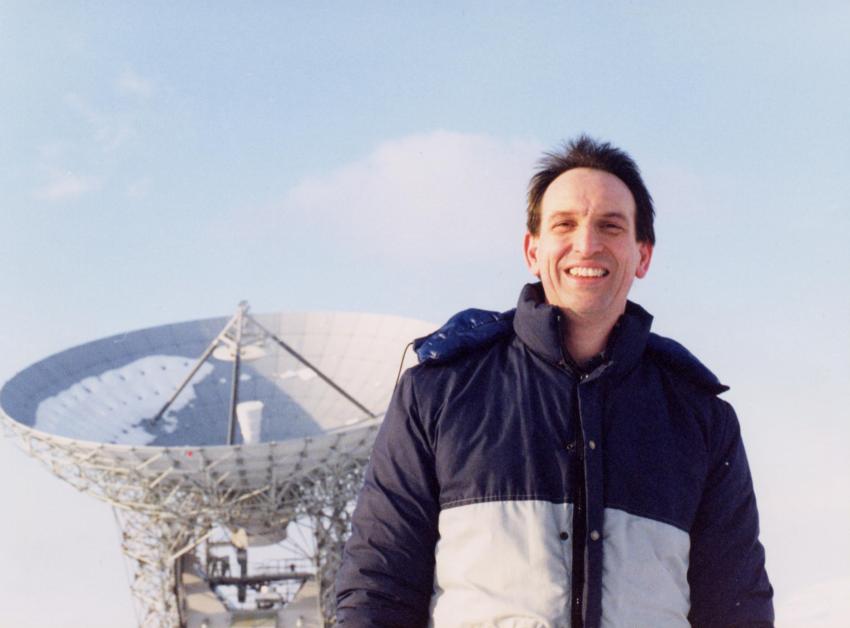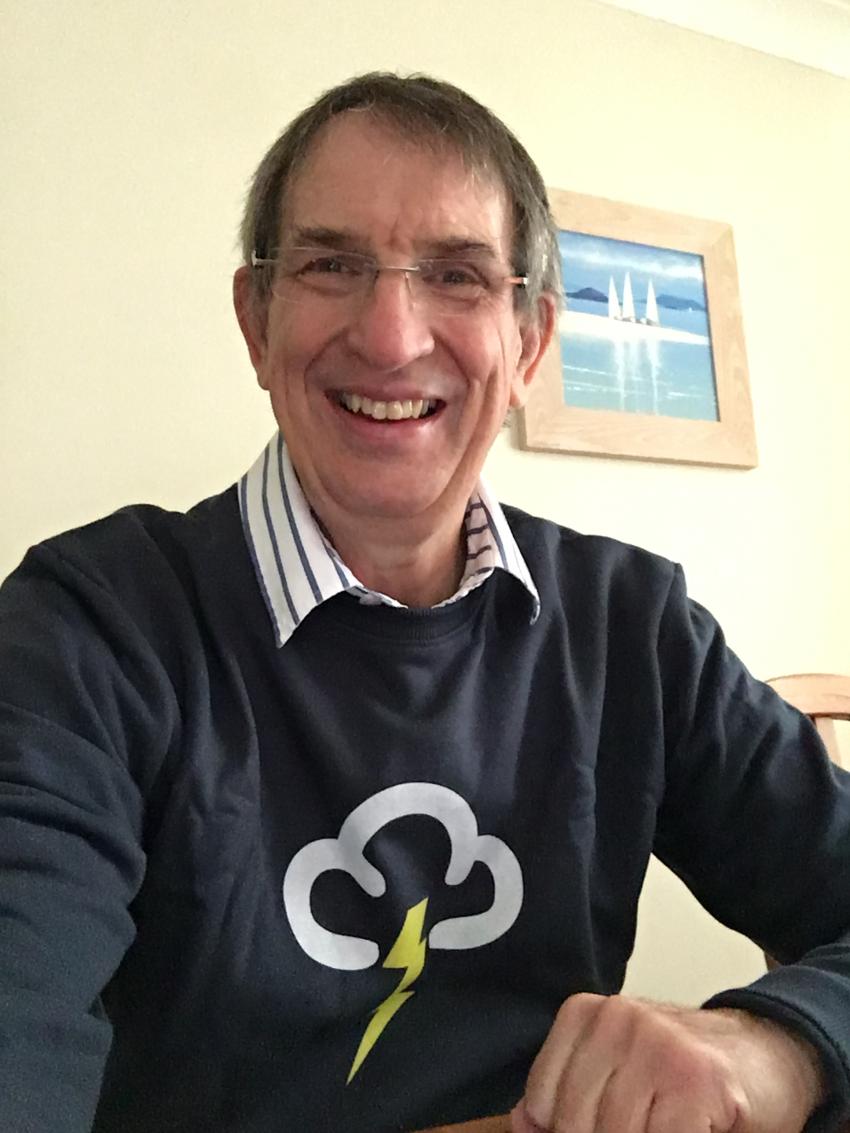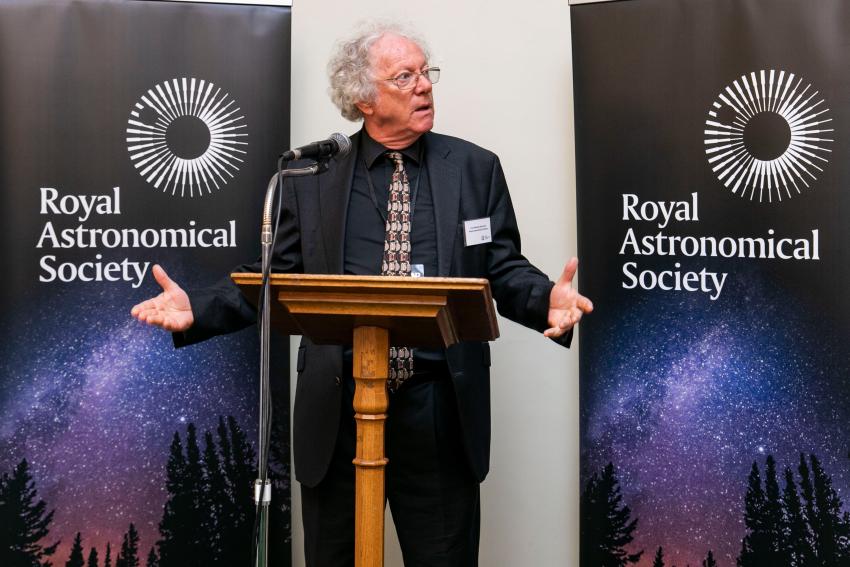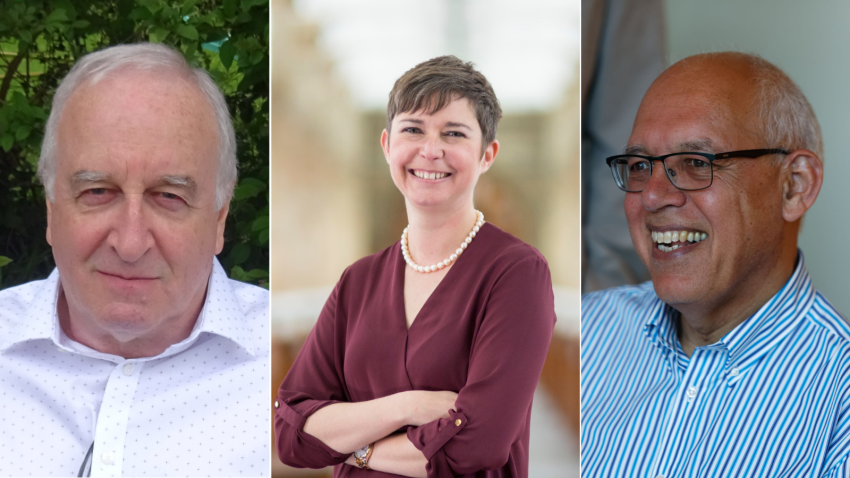An award-winning physicist who specialises in the cutting-edge study of space weather, the Northern Lights and solar radiation has become the new president of the Royal Astronomical Society (RAS).
Professor Mike Lockwood, of the University of Reading, starts his two-year term in the role after taking over from Cardiff University emeritus professor Mike Edmunds.
His appointment was confirmed at the Society’s Annual General Meeting today (Friday 10 May 2024), along with the election of a new treasurer, two vice-presidents and four councillors.
“I am delighted to be taking on the job of president — mainly because when I was a young scientist the RAS was extraordinarily helpful to my career,” said Professor Lockwood, whose work has taken him via NASA, New Zealand and Norway.
“I met people (the right people); I learned how committees work; I used the library; I gave talks at RAS meetings; and I learned from the talks others gave at those meetings.
“Past presidents and Council members made all that possible for me and now it’s my turn to do it for the next generation.”
After completing his PhD in ionospheric physics at Exeter University, Professor Lockwood’s research career began with studies of how Earth's upper atmosphere is influenced by the Sun and, in particular, through the processes associated with the aurora — known in the northern hemisphere as the Northern Lights.
Much of this was done using the state-of-the-art radars in northern Scandinavia, called EISCAT, and a wide variety of European Space Agency and NASA spacecraft.
Professor Lockwood has also investigated the impact of radiation on humans in space, the extent to which solar variability has influenced Earth’s climate, and the effects of space weather on the world’s communication and operation systems.
This is of great importance to the scientific community because it helps experts understand how high-tech systems, such as satellites and electricity networks, may be at risk from solar storms in the future.
Professor Lockwood, who also plays guitar in a rock band called Dumber Than Chickens, credits both his school physics teacher and JFK’s speechwriter for getting him interested in science, citing the iconic words ‘We choose to go to the Moon in this decade and do the other things, not because they are easy, but because they are hard’.
He also joked that it was “the only thing that I was any good at”.
With over 4,000 members, known as Fellows, the RAS encourages and promotes the study of astronomy, solar-system science and geophysics.
“I am from the ‘G-side’ (geophysics) of the Fellowship, but because I look at how Earth is influenced by the Sun, I have always done work that is relevant to the ‘A-side’ (astronomy) as well,” Professor Lockwood said.
“And these are exciting times that are blurring that distinction even further. The reason is a huge explosion of work on extra-solar planets — something that was just a pipe dream when I started out.
“Now knowledge and understanding of Earth is incredibly important in understanding observations of other solar systems.”
In 2015, Professor Lockwood joined the likes of Albert Einstein, Edwin Hubble and Stephen Hawking in being awarded the RAS’s prestigious Gold Medal.
He called it a “huge honour” because “so many famous scientists have won it in the past, including some who made crucial contributions to the development of our understanding of the Sun and how it influences the Earth — the fields I work in”.
Professor Lockwood, who currently holds a chair in space environment physics at the University of Reading, added: “My work has built directly on theirs and I hold them in the greatest respect.”
Looking ahead to his two-year RAS presidency, Professor Lockwood said he was “delighted but also slightly daunted”.
He praised past presidents, treasurers and council members for doing "a fantastic job through difficult times” and made special mention of his predecessor Professor Edmunds, whom he said was “going to be a hard act to follow”.
The other council results are as follows, where "A" covers all areas of astronomy and astrophysics, including exoplanets, and "G" covers geophysics, solar, solar-terrestrial and planetary physics.
The new treasurer is Dr Arvind Parmar, who will serve for a term of five years.
The new vice president (A) is Professor Matthew Griffin, from Cardiff University.
The new vice president (G) is Professor Caroline Smith, from the Natural History Museum and University of Glasgow.
The vice presidents will serve a term of two years.
The four newly-elected councillors, all serving for a term of three years, are:
Professor Stephen Eales (A), Dr Andrew Young (A), Dr Chrysa Avdellidou (G) and Dr Iain Hannah (G).
Media contacts
Sam Tonkin
Royal Astronomical Society
Mob: +44 (0)7802 877700
Robert Massey
Royal Astronomical Society
Mob: +44 (0)7802 877699
Images and captions
Caption: Professor Mike Lockwood, of the University of Reading, has become the new president of the Royal Astronomical Society (RAS).
Credit: Royal Astronomical Society
Caption: Professor Lockwood is an award-winning physicist who specialises in the cutting-edge study of space weather, the Northern Lights and solar radiation.
Credit: Royal Astronomical Society
Caption: Professor Lockwood starts his two-year term as RAS president after taking over from Cardiff University emeritus professor Mike Edmunds (pictured).
Credit: Royal Astronomical Society
Caption: Dr Arvind Parmar has been elected as the Royal Astronomical Society's new treasurer.
Credit: Royal Astronomical Society
Caption: Professor Matthew Griffin, of Cardiff University, has been elected as the new Vice President (A) of the Royal Astronomical Society.
Credit: Royal Astronomical Society
Caption: Professor Caroline Smith, of the Natural History Museum and University of Glasgow, has been elected as the new Vice President (G) of the Royal Astronomical Society.
Credit: Royal Astronomical Society
Notes for editors
About the Royal Astronomical Society
The Royal Astronomical Society (RAS), founded in 1820, encourages and promotes the study of astronomy, solar-system science, geophysics and closely related branches of science.
The RAS organises scientific meetings, publishes international research and review journals, recognises outstanding achievements by the award of medals and prizes, maintains an extensive library, supports education through grants and outreach activities and represents UK astronomy nationally and internationally. Its more than 4,000 members (Fellows), a third based overseas, include scientific researchers in universities, observatories and laboratories as well as historians of astronomy and others.
The RAS accepts papers for its journals based on the principle of peer review, in which fellow experts on the editorial boards accept the paper as worth considering. The Society issues press releases based on a similar principle, but the organisations and scientists concerned have overall responsibility for their content.





